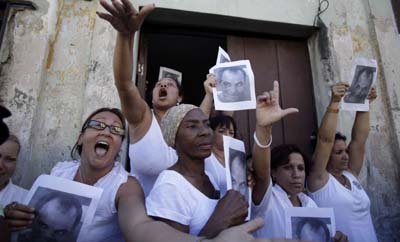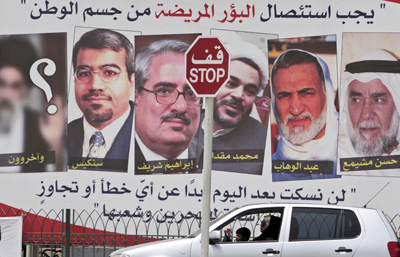News from the Committee to Protect Journalists, July 2011

Still struggling for a free Cuban press
As Cuba implements economic reforms and prepares to introduce high-speed Internet, freedom of expression continues to be met with a policy of repression that stifles the free flow of information, according to a new report by CPJ.
The report examines government activities in March and April 2011, a time when sensitive political milestones on the island coincided with 50 instances of independent journalists’ repression. In the report, CPJ makes recommendations to the Cuban government, the European Union, the United Nations, the Organization of American States, the U.S. government, and the technology and blogging communities.
CPJ welcomes new board members
Five distinguished leaders of new and traditional media worldwide have joined the board of directors of the Committee to Protect Journalists. The new members–John Carroll, Arianna Huffington, Jonathan Klein, Mhamed Krichen, and Jacob Weisberg–join a roster of remarkable journalists and news executives playing a vital role in CPJ’s fight for press freedom.
CPJ chairman Sandra Mims Rowe stated, “I am delighted to welcome these distinguished individuals whose proven leadership and experience strengthen the collective wisdom of our board.”
Assessing online risk
With the introduction of Google +, CPJ Internet and Advocacy Coordinator Danny O’Brien engaged in a thorough assessment of the pros and cons for journalists gathering sensitive information from contacts who must be protected. As someone who intervenes when journalists’ data is at risk or electronic censorship needs to be undone, O’Brien quickly recognizes when the risk line has been crossed. “If you really do believe yourself to be at risk of surveillance or concerned about the seizure of your computer or censorship of your online content, you should strongly consider not using social networks at all,” he writes in a follow-up post to his initial assessment, which explores security features on Facebook as well. Online security will be part of CPJ’s revised safety handbook for journalists, which will be issued in 2012.
Criminal defamation comeback in Ecuador
An editor and three executives from the Ecuadoran news daily El Universo were sentenced to three years in prison and $40 million in fines in July for defaming President Rafael Correa. CPJ had expressed concern about the case in a letter to Correa in April and immediately weighed in on the extraordinary sentence, seeking to shed light on the government’s increasingly repressive anti-press tactics. Numerous press freedom groups have expressed outrage at the decision and the Organization of America States special rapporteur has also criticized the sentence. CPJ research shows that Ecuador’s outdated criminal defamation provisions have been systematically used to punish critical journalists. In June, Senior Americas Program Coordinator Carlos Lauría took part in a roundtable discussion at the Inter-American Dialogue, which addressed the situation in Ecuador, among other issues. The discussion can be heard here.
China’s disastrous censorship
Online and off, China continues its repression of the press. Following a crackdown on journalists, bloggers, and writers, along with the virtual silence in the media regarding these developments, Chinese authorities have obstructed reporting on a deadly train wreck on July 23. Additionally, reports that the China Economic Times has closed its investigative news unit are a concerning sign that pressure is mounting on hard-hitting media outlets in the country. Also in July, independent magazine Caixin claimed that the e-mail account of a reporter exposing child trafficking in China had been hacked.
Despite these setbacks, Chinese artist and commentator Ai Weiwei was freed on June 22 following an 81-day detention that was denounced by intellectuals, human rights and press freedom groups, and ultimately governments worldwide. The Chinese government has denied that international pressure played a role. Still, the petition website Change.org suffered a cyber-attack launched from within China after posting a call for the artist’s release.
In April, the EU’s foreign policy chief criticized the Chinese crackdown and the U.S. protested journalists’ detentions. In June, CPJ Senior Asia Program Researcher Madeline Earp spoke alongside journalists and academics on media freedom and challenges faced by international broadcasters in China at a seminar co-hosted by the BBC Chinese service and the British think-tank Chatham House. The speech, which was broadcast on the BBC Chinese website, is part of CPJ’s ongoing Chinese-language outreach as we assess the ever-evolving challenges reporters face on the ground in China.
Terrorizing ‘terrorist’ journalists
Ethiopia, Africa’s second leading jailer of journalists and a notorious Internet censor, is engaged in a sustained campaign to detain and prosecute those who report critically on issues deemed sensitive by the government. The country has also begun to apply its anti-terrorism law to journalists, accusing an editor and columnist of forming part of a terrorist plot.
The July detention, without charge, of two Swedish journalists who were reporting on armed separatists in an oil-rich province of eastern Ethiopia, has helped put a spotlight on the country’s dismal press freedom record. In fact, even when under intense scrutiny from the United Nations’ Human Rights Committee regarding the country’s anti-terrorism law, government representatives simply responded with bold contradictions of the facts.
But even in cases of vague or trumped-up charges, there is reason to hope. After 15 months of detention, Ethiopia released two journalists on bail. CPJ has questioned the validity of their charges in light of the Ethiopian government’s documented practice of using bogus criminal charges to silence critical journalists. And in another part of the world, a BBC reporter in Tajikistan, detained initially on extremism charges in June, was also granted restricted freedom.
A silencing policy across the Middle East
As journalists in Tunisia and Egypt strive to establish a solid framework for press freedom, a setback has materialized with the reinstatement of Egypt’s information ministry, a move decried by CPJ.
Meanwhile, in Bahrain, Iran, Jordan, and Syria, critical and independent journalism continues to be treated as a threat. CPJ recently called on Bahrain to end harassment and contrived legal proceedings against critical journalists. Since February, government supporters have intimidated, interrogated, smeared in government-owned and -aligned publications, and harassed and sued journalists.
In July, Syria detained a local journalist and expelled an international reporter, while reporters covering protests in Jordan had to endure beatings. Iran continues to arbitrarily detain, imprison, and abuse journalists in custody. Mohammad Davari, a recipient of CPJ’s International Press Freedom Award in 2010, had one year added to a five-year sentence he is currently serving. The reason? Reportedly, a $5,000 fine imposed on the journalist in 2007 was not paid. Iran, together with China, is the world’s leading jailer of journalists, according to CPJ’s 2010 census.
Resisting attacks in Pakistan
Since meeting with President Asif Ali Zardari and Interior Minister Rehman Malik on World Press Freedom Day in May this year, and obtaining a pledge for justice, CPJ Asia Program Coordinator Bob Dietz has urged Pakistani journalists to take immediate measures to protect themselves. A first step has been taken: In July, the International Federation of Journalists and the Pakistan Federal Union of Journalists released a group of posters and brochures in Urdu and English for newsrooms.
Such measures come on the heels of U.S. government allegations that Pakistan’s intelligence service ordered the killing of journalist Saleem Shahzad, a suspicion strongly thought to be true by many Pakistani journalists. The allegation was denounced by Pakistan. CPJ has demanded an explanation of the Inter-Services Intelligence’s role and will continue to seek justice for the 15 cases of journalists apparently targeted for their journalism in Pakistan since the 2002 killing of Wall Street Journal reporter Daniel Pearl.
Upcoming events
Cuba: In September, CPJ will host a discussion based on its findings in “After the Black Spring: Cuba’s New Repression,” a CPJ special report assessing the state of free expression on the island. Check out our events section in August for details.
Donate to the Steiger Fellowship
CPJ has recently launched the Paul E. Steiger Fellowship in 2012. The Steiger Fellow will receive a modest stipend to work at our New York headquarters. Our intention is to increase CPJ’s research capacity and, more important, to help train a young journalist in CPJ’s reporting methodology and professional ethics. Preference will be given to international candidates returning to work in their home countries. CPJ hopes that the Steiger Fellows will go on to become leaders in journalism and the global press freedom movement.
So far, we have raised $75,000 of our $100,000 goal to fund the program. Please click here to donate and add “Steiger Fellow” in the notes section.
Best of the CPJ Blog
A ray of hope for the embattled press in Belarus?
Hong Kong’s accelerating media freedom decline
In Liberia, silencing press critics through libel lawsuits
Kings, queens, and torture in Bahrain
